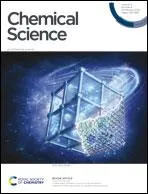Chiral adaptive recognition with sequence specificity of aromatic dipeptides in aqueous solution by an achiral cage
文献情報
Lin Cheng, Ping Tian, Honghong Duan, Qingfang Li, Xiaowen Song, Anyang Li, Liping Cao
Sequence-specific recognition of peptides and proteins by synthetic compounds or systems remains a huge challenge in biocompatible media. Here, we report the chiral adaptive recognition (CAR) with sequence specificity of aromatic dipeptides in a purely aqueous solution using an achiral tetraphenylethene-based octacationic cage (1) as both a molecular receptor and chiroptical sensor. 1 can selectively bind and dimerize aromatic dipeptides to form 1 : 2 host–guest complexes with high binding affinity (>1010 M−2), especially up to ∼1014 M−2 for TrpTrp. Given the dynamic rotational conformation of TPE units, achiral 1 can exhibit chiral adaptive responses with mirror-symmetrical circular dichroism (CD) and circularly polarized luminescence (CPL) spectra to enantiomeric dipeptides via supramolecular chirality transfer in the host–guest complexes. Furthermore, this CAR with sequence specificity of 1 can be applied for molecular recognition of TrpTrp- or PhePhe-containing tetrapeptides, polypeptides (e.g., amyloid β-peptide1–20 and somatostatin), and proteins (e.g., human insulin) with characteristic CD responses.
関連文献
IF 6.222
Microscopic insights into long-range 1D ordering in a dense semi-disordered molecular overlayerIF 6.222
Catalytic depolymerization of alkali lignin in ionic liquids on Pt-supported La2O3–SO42−/ZrO2 catalystsIF 6.367
Strong circularly polarized luminescence of an octahedral chromium(iii) complexIF 6.222
Building microsphere–nanosheet structures in N-doped carbon to improve its performance in the oxygen reduction reaction and vanadium redox flow batteriesIF 6.367
Catalytic depolymerization of Kraft lignin to produce liquid fuels via Ni–Sn metal oxide catalystsIF 6.367
Inside back coverIF 6.222
Engineering nanoporous organic frameworks to stabilize naked Au clusters: a charge modulation approachIF 6.222
In situ growth of all-inorganic perovskite nanocrystals on black phosphorus nanosheetsIF 6.222
Effective utilisation of waste cooking oil in a single-cylinder diesel engine using alumina nanoparticlesIF 6.367
掲載誌
Chemical Science

Our journal has a wide-ranging scope which covers the full breadth of the chemical sciences. The research we publish contains the sorts of novel ideas, challenging questions and progressive thinking that bring undiscovered breakthroughs within reach. Your paper could focus on a single area, or cross many. It could be beyond the accepted bounds of the chemical sciences. It might address an immediate challenge, contribute to a future breakthrough or be wholly conceptual. We’re a team from every field of the chemical sciences, and know from experience that breakthroughs that drive the solutions to global challenges can come from anywhere, at any time. You could even start an entirely new area of research. Too bold? Too progressive? No such thing
おすすめサプライヤー
 TKT—Kunststoff—Technik GmbH
TKT—Kunststoff—Technik GmbH 壽光市源美食品科技有限公司
壽光市源美食品科技有限公司 永清県創佳化工有限责任公司
永清県創佳化工有限责任公司 ジャンティ・インダストリーズ株式会社
ジャンティ・インダストリーズ株式会社 ミシェル・バウレ SA
ミシェル・バウレ SA デḢ Ao ジアタイ 化学 科技 有限公司
デḢ Ao ジアタイ 化学 科技 有限公司 Brewersville Donggao Chemical Co., Ltd.
Brewersville Donggao Chemical Co., Ltd. グロトンバイオシステムズ
グロトンバイオシステムズ 北京金源化学グループ有限公司
北京金源化学グループ有限公司 Depthseng Dengnu Longbang Xincai Gongsi
Depthseng Dengnu Longbang Xincai Gongsi














